DAVE'S DIARY - 1 JUNE 2014 - LUKE O'SHEA CD REVIEW
LUKE O'SHEA
SING YOU UP (WJO)
LUKE LAUDS LADIES OF THE LAND
“I am the Lady of the Land/ I've been there and back again/ been down some long and winding roads/ but with him I was always home/ my father was a teacher man/ my mother helped Mary Magdalene/ but with my sister we would go/ sing our songs in a travelling show.” - Lady of the Land - Luke O'Shea-Drew McAlister.
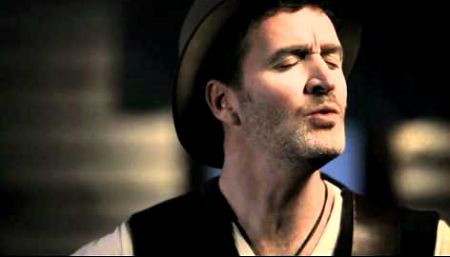 |
As a fifth generation Victorian Shipwreck Coast dairy farmer I empathise with strong rural women who keep the home fires burning.
Sydney singer-songwriter Luke O'Shea eulogised Henry Lawson's The Drover's Wife as the title track of his acclaimed fourth album.
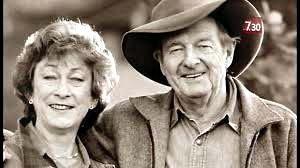 |
Now on his fifth disc the focal point Lady Of The Land praises Joy McKean - singing spouse of the late Slim Dusty who was raised on a dairy farm at Nulla Nulla Creek near Kempsey. O'Shea also lauds Joy's sister-in-song Heather - one of the pioneering McKean Sisters - who worked the agricultural show and bush rodeo circuit before country was cool in the cities and towns. |
I have vivid memories of the McKean Sisters visiting my hometown Warrnambool with late bush balladeer Slim AO-MBE, Buddy Williams and sometimes even Tex Morton and his whip cracking daubed with a dab of hypnotism.
Equally enlightening was the return to the Bible Belt capital of Smoky Dawson AM-OBE, who lived the first four years of his life with his locum dad, mentally bruised from an earlier war, above a pharmacy in one of the city's main streets.
Smoky's singing spouse Dot earned her radio stripes in the big smoke and lived to be a centenarian - if not a centurion.
She also made trips down the Princes Highway where Smoky competed post World War 11 in the Warrnambool-Melbourne push bike race after being deemed medically unfit for battle.
But Smoky, who lived to the ripe young age of 94 just a month shy of his 95 th birthday, toiled in the medical corps while not entertaining fellow soldiers with his music.
I recall those visits with help from my long deceased dairy farmer dad who organised and toiled in working bees as volunteer president of the local agricultural show committee.
It was long before the age of entitlement for city slickers so the offspring and townies combined to celebrate the fruits of their labour with music and opportunities to chance their arm against the Jimmy Sharman boxing troupe.
But I digress - O'Shea's tribute is more specific.
Check out his video clip on Nu Country TV this week with his cinematic celebration of the McKean Sisters.
Luckily there's no footage of Heather winning a Golden Guitar at Tamworth in 1983 and embracing this bearded bloke who was seated next to her near the front of the tent.
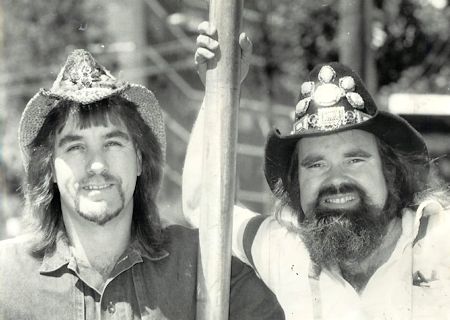 |
The result was a story in the now defunct Sydney Daily Mirror praising her stoicism after being dumped by her former marital minstrel Reg Lindsay for a younger woman.
Not sure if that was what prompted Reg's threatened law suits against the newspaper or the song that Wolverines singer Darcy LeYear and I wrote about him.
Hillbillies Hate Change was launched with another Mirror story on Edith Bliss playing Reg's role - sweeping bar-room floors - on Simon Townsend's Wonderworld TV show the day Darcy opened for Reg at a memorable gig in Troy Cassar-Daley's hometown of Grafton.
Yes, art does imitate life - even in country music.
But I have digressed again.
CANNON FODDER - NOTHING LEFT FOR THE LIVESTOCK
“So where have all the men gone/ mothers - where are all your sons/ we threw them all away and we'd only just begun/ a shattered generation/ each town it fell apart/ and one hundred years is not enough to mend the broken hearts /of the Great War - the great Great War - such a great waste Lord!” - Three Brothers - Luke O'Shea.
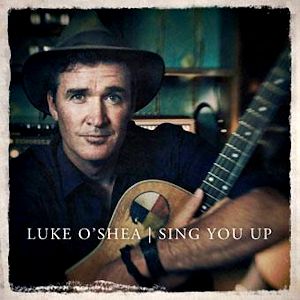 |
Equally eulogistic is O'Shea tune Three Brothers - provocative tale of sibling soldiers and sons of the soil from the same town sacrificed as cannon fodder in not so aptly titled Great War , nearing its centenary on July 28. O'Shea doesn't praise masters of that war for massive miscalculations of strategy but rural refugees who made the ultimate sacrifice. The singer personalises his parable by drawing pen pictures of three of the victims - a tactic that works with a vengeance for the surviving families of the victims. Those credible characters include the youngest - the courageous captain coach of the local footy team who only lasted “three steps on the shore of Gallipoli .” |
Then there's the school teacher who met the love of his young life on the dance floor of a ball at his town hall but perished “when the shells, they rained like teardrops fell - in Pozieres in France .”
Third cab off the rank to the grave is the eldest - “a farmer who once loved to laugh and joke/ but three years on the Western Front something inside him broke/ so much death, the gas, the bombs, few can understand.”
Teacher O'Shea shares profession with formed politician and Redgum singer John Schumann whose evocative tune Only 19 picked up the baton for survivors of the Vietnam War.
It was just a marble spin between life and death for a vast raft of teenagers whose most famous surviving conscript was Normie Rowe - another visitor to Warrnambool before being drafted.
I'm grateful I was always a loser at marbles and ventured overseas in a different battle, invading Van Diemen's Land as a cadet journalist in the sixties and finding Launceston just like Warrnambool in the fifties.
But I digress again - let's back track to the album entrée, a tribute to our original land custodians.
SING YOU UP
“For fifty thousand years/ there has been a song/ sung by those who care about this land that we walk upon/ both if those lines are lost, all is laid to waste/ as wave after wave from the world washes in, carrying us away.” - Sing You Up - Luke O'Shea.
O'Shea's celebration of our indigenous peers - Sing You Up - shares sentiments with western Victorian song healers Shane Howard and Neil Murray.
Howard, as lead singer of Warrnambool and Geelong fuelled band Goanna , was well qualified to write Solid Rock for his chart topping band in the eighties.
Shane was one of several singing siblings raised in a tiny two story cottage on the banks of the Merri River in the shadows of the mighty Nestles milk factory where his dad Leo toiled all his working life.
Like many local lads he played footy in teams that featured a brace of indigenous champions - he also experienced racism as less well educated townie hoonies staged regular battles with descendants of our pioneers.
Howard and Lake Bolac balladeer Neil Murray nurtured musical and cultural cross-fertilisation in frequent forays into the vast expanses of the outback and Ireland .
It's continually illustrated in modern times in their succession of band and solo albums.
O'Shea also left behind the concrete corrals of the cities as he travelled through our bush and outback and way beyond into the U.S. and Europe as a teacher and entertainer.
But equally importantly as a songwriter he turned his troubadour tours into songs that credit our indigenous ancestors.
I don't wish to digress again but my folks were the original boat people back in the 1840's on vessels from old Ireland and Scotland .
Not sure if they would be as keen to identify with latter day killing fields of Brunswick farm land, where cattle once roamed, for the more fertile pastures on the banks of the Hopkins River and inland.
ARCING BACK TO NOAH
“So with a broken heart she returned to the ark/ with an olive branch within her beak/ but the egg was gone so she prayed to the Lord/ to finally grant the world peace/ so if you hear the song of the Currawong/ if you listen closely you now know/ it's about my father who was black as night/ And my mother who was white as snow.” - White Dove Black Crow - Luke O'Shea.
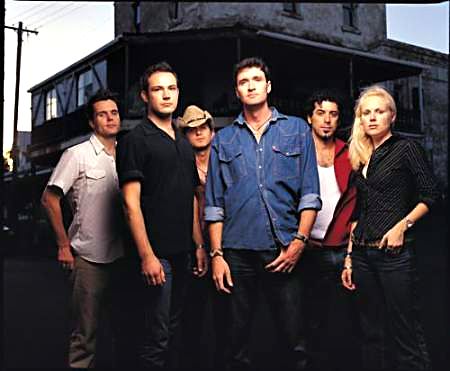 |
O'Shea's Biblical paean White Dove Black Crow is a poignant parable reaching back to the go and whoa of Noah with a sting in the tail of the tale.
Sometimes it's in the best interests of reviewers to leave pungent punch-lines to listeners and viewers to interpret and enjoy without unnecessary steerage from afar.
It's happened many times before with songs diverse as Woodstock veteran Tom Pacheco's Robert & Ramona and Texan Charlie Robison's oft recorded Desperate Times .
In Robert & Ramona two young bandits go off a cliff after stopping for a big mac and fries in a post coital passion pit stop.
Better still is Pacheco's The Other Side where the recently deceased victim of an armed robbery by two cocaine dealers in a Rolls Royce has his pockets picked by a priest.
But on arrival at the pearly gates he slams his angel into reverse and is resurrected as he finds his way back to earth through a hole in the ozone layer.
If you want something a little more digestible try O'Shea exploring family memories in Dad's Bottom Drawer - a familiar tale of adolescent exploration in maternal and paternal pirate raids of musty nooks that uncover a Jim Bowie knife, shot gun shells, war medals and ribbons.
The singer turns his tale into a generational gambol, or is it gamble, by divulging pre-marital memories in photographs and the message that history repeats.
There's also a nice metaphor about wilting love on the 15 th wedding anniversary on Truckstop Flowers - a delicious duet with Aleyce Simmonds.
Yes, there is gymnastic germination in the floral road song.
CANE COUNTRY WAYNE AND WANITA
“Well they were working on a stretch just out of Proserpine/ when a little red Suzuki, she was first in line/ now Wanita was a woman of large dimensions/ and she kinda liked the way they got Wayne's attention/ well now Wayne gave her a wink, Wanita gave a smile/ and they started off with talking just to pass the time/ and all the seconds turned to minutes and the minutes passed away/ while the cars and trucks behind them were going insane/ and they would raise their arms/ he'd say ‘Just another minute!' and they would blow their horns/ he'd say ‘just another minute'/ and the CB would cry and he had to let her go/ with the sign that said Stop/ the other side Slow.” - Wayne And Wanita - Luke O'Shea.
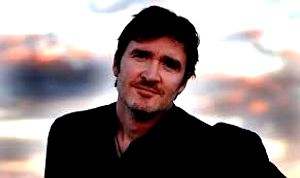 |
O'Shea also mixes chalk with champers in his Queensland cane country romance - Wayne and Wanita. The lyrics above may have given away much of the plot but might be a helpful hint as to why Princess Highway road works - making it a four lane express road between Geelong and Winchelsea - have taken so long. Maybe there will be a population explosion before that route reaches its Colac climax. |
There's also Byron Bay fuelled Hillbilly Hippie that echoes cowboy-hippie nuptials of seventies Texan outlaws.
The male son of the soil lead falls in love with a hillbilly filly with an artist mother and cowboy father.
Despite her ear-ring in her nose and, maybe because of her disdain of bras and lentils love, she's the perfect match for the good old boy who antagonises his peer group by growing his hair in perhaps a hirsute hint from Jesus.
O'Shea injects nostalgia and reality into a healthy hybrid in Fill it Up With Love where nocturnal family love negates stresses of work and train travel and pain and pleasure during life's joyous journey in Perfect Plan, Passenger Seat and Watch Things Grow.
The most turbulent time travel is the trip back to a male's first ruptured romance in Seventeen where the one that got away was aided and abetted by her Texan oil man father who never allowed the teens to say goodbye.
It's not an isolated incident - I'm sure many listeners will identify with the beau's battle to ever love again with same passion.
The bucolic belle provided the musical soundtrack and maybe even the car keys and license to love.
Oh, you're wondering about the quality of the music.
Well O'Shea ensures accessible song delivery by producing this gem with engineering polish from Stuie French and Jeff McCormack.